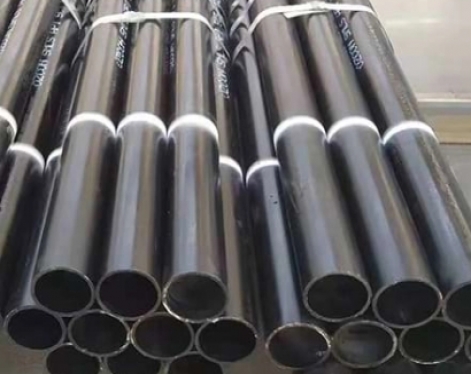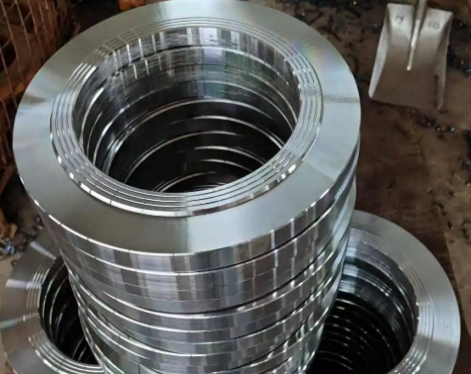Boiler tubes are key components in boiler systems, responsible for transporting high-temperature, high-pressure water or steam. They are commonly made using seamless pipes for superior strength and uniformity, or ERW pipes for cost-effective and precise applications. A broken boiler tube—whether seamless or ERW—can seriously affect the safe operation of the boiler and may even lead to serious accidents. The causes of boiler tube breakage vary, often involving factors such as materials, design, manufacturing, operation, and maintenance. The following is a detailed analysis of the causes of boiler tube breakage:
1. Material issues
Material defects: The material quality of boiler tubes directly affects their service life. If the material itself has defects such as inclusions, pores, and cracks, it will accelerate the expansion of cracks under high temperature and high pressure environments, eventually leading to fracture.
Improper material selection: Boiler tubes operate in a complex environment, often requiring them to withstand high temperatures, high pressures, and corrosive media. If the selected material does not meet these requirements, such as insufficient heat resistance, corrosion resistance, or strength, it can easily break.
Material aging: During long-term use, the material of boiler tubes will age, resulting in a decrease in its mechanical properties, such as strength, toughness and ductility, which may eventually lead to fracture.
Stress concentration: If there is an unreasonable structure in the design of boiler tubes, such as too small bending radius, sharp transition area, etc., it will cause stress concentration and accelerate the generation and expansion of cracks.
Improper thermal expansion design: The boiler will produce thermal expansion during operation. If the impact of thermal expansion is not fully considered during design, it may cause excessive stress on the boiler tubes, which may lead to fracture.
3. Manufacturing issues
Welding Defects: The quality of boiler tube welding directly affects its strength. Defects such as incomplete penetration, porosity, and slag inclusions can significantly reduce the strength of the weld joint and become the source of cracks.
Cold working defects: During the manufacturing process, if the boiler tube is cold worked (such as cold bending, cold drawing, etc.), residual stress or micro cracks may be introduced. These defects will gradually expand under high temperature and high pressure environment and eventually lead to fracture.
Improper surface treatment: Improper surface treatment of boiler tubes (such as polishing, coating, etc.) may cause surface defects or corrosion, which in turn affects their service life.

4. Operational issues
Overpressure Operation: If the pressure during boiler operation exceeds the design value, the boiler tubes will be subjected to excessive stress and may break.
Over-temperature operation: Boiler tubes work in a high-temperature environment. If the temperature exceeds the allowable range of the material, it will cause the material performance to deteriorate, accelerate creep and oxidation, and eventually lead to fracture.
Thermal fatigue: When the boiler is frequently started and stopped or the load fluctuates, the boiler tubes will experience repeated thermal expansion and contraction, which will lead to the generation and expansion of thermal fatigue cracks.
Improper water treatment: If the parameters such as impurities, dissolved oxygen, pH, etc. in the boiler water are not properly controlled, it will lead to corrosion, scaling or hydrogen embrittlement of the inner wall of the boiler tube, which will cause rupture.
5. Maintenance issues
Corrosion: If boiler tubes are not effectively treated or maintained during operation, they will gradually become thinner due to corrosion, eventually leading to fracture. Common types of corrosion include oxygen corrosion, acid corrosion, and alkaline corrosion.
Scaling: Impurities in boiler water can form scale on the inner walls of boiler tubes, reducing heat transfer efficiency and causing localized temperature increases, leading to overheating and fracture.
Crack Growth: If small cracks in oiler tubes are not detected and repaired promptly during use, they can gradually expand and eventually lead to fracture.
Improper maintenance: Regular inspection and maintenance of the boiler is an important measure to ensure its safe operation. If the maintenance is not done properly, such as not cleaning the scale in time and not replacing the aging parts, it will accelerate the damage of the boiler tubes.
6. External factors
Mechanical damage: Boiler tubes may suffer mechanical damage during installation, transportation or operation, such as collision, scratches, etc. These damages may become the origin of cracks.
External corrosion: If the boiler tube is exposed to a corrosive environment, such as moisture, acid rain, etc., it will accelerate its corrosion, resulting in wall thinning and fracture.
Vibration and shock: If the boiler is subjected to external vibration or shock during operation, it may cause stress concentration in the boiler tubes, leading to fracture.
Read more: Bending Performance of Boiler Tubes
1. Material issues
Material defects: The material quality of boiler tubes directly affects their service life. If the material itself has defects such as inclusions, pores, and cracks, it will accelerate the expansion of cracks under high temperature and high pressure environments, eventually leading to fracture.
Improper material selection: Boiler tubes operate in a complex environment, often requiring them to withstand high temperatures, high pressures, and corrosive media. If the selected material does not meet these requirements, such as insufficient heat resistance, corrosion resistance, or strength, it can easily break.
Material aging: During long-term use, the material of boiler tubes will age, resulting in a decrease in its mechanical properties, such as strength, toughness and ductility, which may eventually lead to fracture.
2. Design issues
Insufficient wall thickness design: The wall thickness design of the boiler tube should be calculated according to the working pressure and temperature. If the wall thickness design is insufficient, it cannot withstand the stress under working conditions and is prone to breakage.Stress concentration: If there is an unreasonable structure in the design of boiler tubes, such as too small bending radius, sharp transition area, etc., it will cause stress concentration and accelerate the generation and expansion of cracks.
Improper thermal expansion design: The boiler will produce thermal expansion during operation. If the impact of thermal expansion is not fully considered during design, it may cause excessive stress on the boiler tubes, which may lead to fracture.
3. Manufacturing issues
Welding Defects: The quality of boiler tube welding directly affects its strength. Defects such as incomplete penetration, porosity, and slag inclusions can significantly reduce the strength of the weld joint and become the source of cracks.
Cold working defects: During the manufacturing process, if the boiler tube is cold worked (such as cold bending, cold drawing, etc.), residual stress or micro cracks may be introduced. These defects will gradually expand under high temperature and high pressure environment and eventually lead to fracture.
Improper surface treatment: Improper surface treatment of boiler tubes (such as polishing, coating, etc.) may cause surface defects or corrosion, which in turn affects their service life.

4. Operational issues
Overpressure Operation: If the pressure during boiler operation exceeds the design value, the boiler tubes will be subjected to excessive stress and may break.
Over-temperature operation: Boiler tubes work in a high-temperature environment. If the temperature exceeds the allowable range of the material, it will cause the material performance to deteriorate, accelerate creep and oxidation, and eventually lead to fracture.
Thermal fatigue: When the boiler is frequently started and stopped or the load fluctuates, the boiler tubes will experience repeated thermal expansion and contraction, which will lead to the generation and expansion of thermal fatigue cracks.
Improper water treatment: If the parameters such as impurities, dissolved oxygen, pH, etc. in the boiler water are not properly controlled, it will lead to corrosion, scaling or hydrogen embrittlement of the inner wall of the boiler tube, which will cause rupture.
5. Maintenance issues
Corrosion: If boiler tubes are not effectively treated or maintained during operation, they will gradually become thinner due to corrosion, eventually leading to fracture. Common types of corrosion include oxygen corrosion, acid corrosion, and alkaline corrosion.
Scaling: Impurities in boiler water can form scale on the inner walls of boiler tubes, reducing heat transfer efficiency and causing localized temperature increases, leading to overheating and fracture.
Crack Growth: If small cracks in oiler tubes are not detected and repaired promptly during use, they can gradually expand and eventually lead to fracture.
Improper maintenance: Regular inspection and maintenance of the boiler is an important measure to ensure its safe operation. If the maintenance is not done properly, such as not cleaning the scale in time and not replacing the aging parts, it will accelerate the damage of the boiler tubes.
6. External factors
Mechanical damage: Boiler tubes may suffer mechanical damage during installation, transportation or operation, such as collision, scratches, etc. These damages may become the origin of cracks.
External corrosion: If the boiler tube is exposed to a corrosive environment, such as moisture, acid rain, etc., it will accelerate its corrosion, resulting in wall thinning and fracture.
Vibration and shock: If the boiler is subjected to external vibration or shock during operation, it may cause stress concentration in the boiler tubes, leading to fracture.
Read more: Bending Performance of Boiler Tubes









